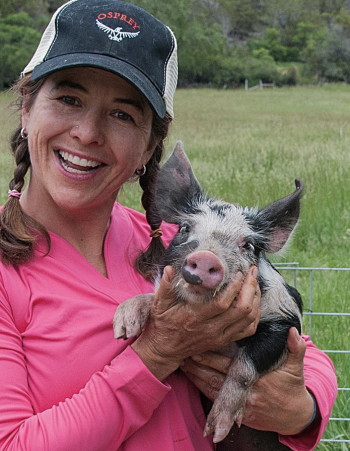Thought Leaders: Alison Gannett interviews Bill McKibben

Photo: Nancie Battaglia
ECO WARRIORS ON THE GOOD FIGHT
At WomensMovement.com, we believe that it shouldn’t just be journalists asking the questions. That’s why we’re launching a new column: Thought Leaders. In it, we’ll post provocative interviews and conversations between two luminaries in one field. Think of it as being a fly on the wall of some of the most important—and intriguing—conversations in our world. [Edited by Kate Siber]
For our first, pro skier, sustainability consultant, and Patagonia ambassador Alison Gannett interviewed activist and environmental author Bill McKibben on climate change, apathy, and activism. Gannett is currently fighting fracking leases near her organic farm in Paonia, Colorado, and McKibben’s newest book is The Global Warming Reader.
Alison Gannett: Why do you think educated, well-intentioned, caring people that believe in a more sustainable life aren’t taking the climate crisis more seriously?
Bill McKibben: I think because it seems too large for any of us to actually effect. Which is, in essence, true—on an individual basis, one light bulb or Prius at a time, we can’t make much difference. At this point, the time is so short and the trouble so large (I mean, the Arctic has already melted) that we need deep structural change. And that can only come when we join together in an effort to change the underlying politics: above all, to break the power of the fossil fuel industry, richest enterprise on earth, which has managed to block effective action in D.C. and elsewhere for a quarter century.
Gannett: What do you think are the few most important actions that people who care can do?
McKibben: Join in the larger fight! 350.org, which we started with myself and seven college undergraduates in 2008, has grown into the largest global climate campaign. In this country, we are working on two things particularly right now. One is the campaign to shape Obama’s climate legacy—especially, for the moment, the battle against the Keystone Pipeline, which the president will approve or not sometime this spring. We’re gathering in DC on president’s day weekend for what looks to be the largest environmental rally in a long time.
We’re also helping spearhead the rapidly mushrooming drive for divestment from fossil fuel companies. On 192 colleges, and a growing number of religious denominations and city governments, activists are asking that these institutions sell their fossil fuel stock. If it’s wrong to wreck the climate, it’s wrong to profit from that wreckage. Several colleges have already divested. If you’re a student or an alumnus you can play a huge role. Check out gofossilfree.org
Gannett: In November, you hit the road on the “Do the Math” tour, a series of events that aimed to galvanize action against fossil fuel extraction and use. Do you think the tour has helped change the above issue?
McKibben: I think it mostly just showed the depth of eagerness to get something done. We sold out big concert halls in cities across America, red state and blue, for 22 straight nights. It was kind of fun—and kind of tiring! It was like a mixer for activists—everyone saw that there were far more people like them then they knew.
Gannett: In your opinion, what is the biggest barrier to enacting change, especially large-scale change such as moving away from a growth-based way of life?
McKibben: The fact that fossil fuel doesn’t cover its costs. Global warming has been called the greatest market failure of all time—fossil fuel companies can pour their waste into the air for free, so they’ve held an unfair advantage over sun and wind. In a word, they cheat (and they spend billions in campaign and lobbying money to make sure they get to keep on cheating).
Gannett: Have you tracked your own personal carbon footprint over the years? Success story? Any failures that you have learned from?
McKibben: At home I’m pretty clean. Solar panels everywhere, even a car that plugs into the wall so I can run it off the sun. But when I travel to help organize 350.org, I pour lots of carbon into the air. I hope it’s worth it—as I say, we’re not going to win this battle with personal changes as much as political ones.
Gannett: In your book, Eaarth: Making a Life on a Tough New Planet, you argue that climate change is affecting us now and is no longer some strange thing that will affect future generations. As a skier and climate activist, I totally agree—many of the places I’ve skied around the world have disappeared in the last ten years. Given that we need to keep almost all fossil fuels underground forever for us to stand a fighting chance, how do we get there fast enough?
McKibben: We have to go as fast as we can. Stopping global warming is no longer on the menu of possibilities. All we can hope for is to keep it from getting worse than it has to—to make it a difficult century, not an impossible one. Oh, and we have to appreciate the still-beautiful world. We’ve just had our first small snow of the year—I’m headed out into the woods for a ski.
Kamagra oral jelly Online something to buy the most convenient way. He doesn’t demand from you any actions except how to visit the website. And in separate with goods necessary to you to put the end. To specify your address and to wait for the supplier to whom you will give money.



LET'S GET SOCIAL